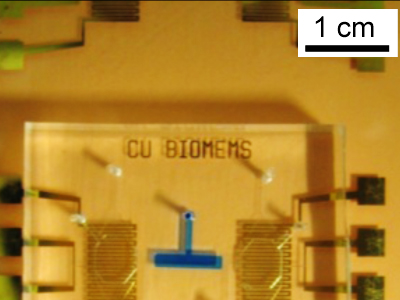New Grant Funds Personalized Minimal Residual Disease Monitoring in Multiple Myeloma
Qiao Lin, associate professor of mechanical engineering, has recently received a new grant to fund precision medicine research with collaborators at Columbia University Medical Center (CUMC) targeted at multiple myeloma, a cancer of antibody-producing plasma cells.

A microfluidic device that iteratively carries out a series of biochemical processes in microchambers to produce aptamers targeting MRD-indicating antibodies.
A very important issue in treatment of multiple myeloma is reliable monitoring for minimal residual disease (MRD) in patients in order to assess relapse after remission and to adjust their therapy, says Lin. Currently MRD is monitored by detection of antibodies in serum using methods that lack adequate sensitivity, or by examination of plasma cells in bone marrow aspirates, which is an invasive technique with a high failure rate due to poor survival of plasma cells and frequent insufficient yield. In this new research, being funded by Columbia’s Irving Institute, Lin and his collaborators, Milan Stojanovic (medical sciences) and Tilla Worgall (pathology and cell biology), propose a non-invasive, personalized method for MRD monitoring.
“As the result of our work, we will have demonstrated a rapid, cost-effective, and highly reliable protocol that would enable personalized monitoring of minimal residual disease in myeloma patients,” says Lin. “We are thrilled at the opportunity to leverage emerging technological tools to create potentially transformative methods for the diagnosis and treatment of cancer and other diseases in a manner tailored to individual patients, thereby attaining the paradigm of precision medicine.”
Lin and his team will develop a method to produce, within a day, and at low cost, patient-specific aptamers (synthetic, short single-stranded DNA that recognize disease biomarkers) as reagents in personalized diagnostic analysis to detect whether a patient is in remission or if there is evidence of relapse. This will be enabled by a microfluidic device that integrates and automates the process of discovering aptamers from a library of DNA strands containing up to 100 billion randomized sequences. That is, the device will accept a patient’s serum as input, and produce an aptamer specific for the antibody that is indicative of MRD. The aptamer can then be used to construct highly sensitive, serum-based, noninvasive assays for detection of MRD in the patient.
Lin conducts research in the area of microelectromechanical systems (MEMS) with applications to biology and medicine. He directs the Columbia BioMEMS Laboratory whose current research is focused on designing and creating micro/nanosystems, in particular microelectromechanical systems (MEMS), for controlling the motion and measuring the dynamic behavior and interactions of biomolecular and cellular systems. The goal of these systems is to facilitate the understanding of fundamental biophysical phenomena, and to enable practical biomedical applications.
The multiple myeloma research is being funded by a Precision Medicine Pilot Award, a new funding program from Columbia’s Irving Institute for Clinical and Translational Research. The program is funding research projects that focus on approaches to tailor medical care (prevention, diagnosis, and/or treatment) to the individual patient. The newly formed concentration on precision medicine is a University-wide initiative and joins research and clinical faculty at Columbia University Medical Center with colleagues across many disciplines including engineering, law, and public health.
